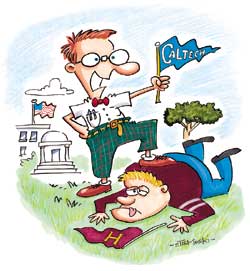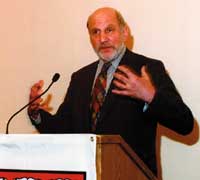![]()
Main Menu ·
Search ·
Current Issue · Contact · Archives · Centennial · Letters to the Editor · FAQs
![]()
Main Menu ·
Search ·
Current Issue · Contact · Archives · Centennial · Letters to the Editor · FAQs

 GOING WEST: A "technical change" in methodology caused U.S. News & World Report to rank schools with strong science and engineering programs more favorably in its annual beauty contest. As a result, California Institute of Technology, a perennial top-10 finisher, came in first among national universities--marking the first time in the 1990s that a school other than Harvard, Princeton, or Yale (the three tied at the top last year) has been anointed the nation's best. This year, the magazine placed Harvard second, MIT third, Princeton and Yale tied for fourth, Stanford sixth, and then Duke, Johns Hopkins, and the University of Pennsylvania in a tie for seventh, just ahead of Columbia. Cornell and Dartmouth (tied for eleventh) and Brown (a three-way tie for fourteenth) rounded out the Ivy cohort |
Rising Yield
Harvard proudly boasts an 80-percent undergraduate "yield" (the percentage of applicants offered admission who decide to attend), the highest among peer colleges. Now there are hints that the Graduate School of Arts and Sciences, bolstered by more competitive financial-aid packages (see "The Loneliness of the Long-Distance Scholar," January-February, page 64), is attracting more of its top candidates, too. The overall yield for students beginning graduate studies at Harvard this fall was 57 percent, up modestly from last year. That result was driven by a jump to 74 percent among humanities students, up from 68 percent in 1998, and a two-point rise, to 57 percent, in the social sciences--the two fields where financial-aid packages were enriched and guaranteed for longer terms for students entering this year.
Law Publishing Lionized
Cardozo, the magisterial biography by Andrew L. Kaufman, Fairchild professor of law, was named the best law book of the year by Scribes, the American Society of Writers on Legal Subjects. The book was published by Harvard University Press, and reinforces recent recognition of its excellence in producing works of legal scholarship.
A recent study of the monographs published since 1978 that are most often cited in scholarly works on the law found that, "Of the 50 titles on this list, an amazing 25 were published by Harvard University Press, including five of the first six." In the view of the study's author, Fred R. Shapiro, J.D. '77, associate librarian for public services and lecturer in legal research at Yale Law School, this showing "entitle[s] Harvard to be regarded as the dominant scholarly law publisher of the last two decades."
Nota Bene
Exemplary humanist. Winners of the National Humanities Medal--nominated by the National Endowment for the Humanities and selected by President Clinton--included Conant University Professor emeritus John Rawls, the philosopher best known for A Theory of Justice. Medals were also conferred on seven other honorees, ranging from Garrison Keillor and Jim Lehrer to Steven Spielberg and August Wilson, at the White House on September 29.
Special scientist. Seymour S. Kety, professor of neuroscience in the department of psychiatry emeritus, received the Lasker Award, the nation's foremost award in medical science, for a lifetime of research that has included discoveries that led to understanding the biological basis of mental illness and work that preceded the invention of modern brain imaging.
Design department. The Harvard University Art Museums have established a new department of architecture and design in collaboration with the Graduate School of Design. Led by adjunct curator of architecture and design Brooke Hodge--who is also director of lectures, exhibitions, and academic publications at the design school--the new department will mount architecture exhibitions drawing on both institutions' resources. A $1-million gift from architect Graham Gund, M.Arch. '68, MAU '69, supports the new program.
 Fifteen Candles: "'Why do you run this program so sloppily? Can't you set a deadline each year for when fellows have to apply, rather than admitting them all through the year?'" So Henry J. Steiner, Smith professor of law, shown above, rhetorically described questions about his stewardship of the Law School's Human Rights Program. "I reply," he said, "'We can't, because we never know when they will get out of prison.'" The remarks, made at the program's fifteenth anniversary dinner September 18, came at the midpoint of a weekend of symposia that drew human-rights leaders from around the world. The keynote speaker was Nobel laureate in economics Amartya Sen, Lamont University Professor emeritus and now master of Trinity College, Cambridge University. He made a ringing defense of human rights broadly defined, motivated by each individual's commitment to encourage other people's freedom to realize their potential, and the opportunity to help others achieve rights. Although the law-school program has trained human-rights leaders from dozens of countries, Steiner noted, it is less secure financially than more recently established, complementary ventures at the School of Public Health and the Kennedy School; efforts are under way to raise $10 million in permanent funding. |
Professorial pay, part II. As reported in the prior "Brevia" (September-October, page 75), Harvard full professors ranked second nationally in academic pay in an American Association of University Professors survey. But according to the Pope Center for Higher Education Policy, of Raleigh, North Carolina, that survey fails to account for differences in the cost of living. Using such data--which are considered imprecise at best--the center calculates that Harvard professors ranked twenty-seventh nationally, well below their counterparts at the University of Chicago, Cornell, and Yale, among others--all in cities where housing costs are much lower than in the Boston area.
Top technologist. Daniel Moriarty became the assistant provost for information technology and Harvard's chief information officer September 1. He will oversee planning for information technology, and, together with University provost Harvey V. Fineberg, will cochair the Harvard Academic Computing Committee, which examines teaching methods, the digital library initiative, and distance learning. Moriarty, who moves over from the Medical School, is also responsible for technology services and support and for Project ADAPT, which is installing Harvard's new financial and human-resources systems.
Less information, please. Although debate continues over access to information gathered as part of federally funded research (see "Tug of War over Researchers' Data," May-June, page 65), scholars' concerns are apparently being taken into account. The office of Management and Budget in August promulgated revised draft regulations governing disclosure. Among the data given protection in the new draft are personnel and medical files, and information that could be used to identify individual research subjects. Following further comment, final regulations were scheduled to be issued, as this issue went to press.
Student souls. A standing-room-only crowd estimated at 1,500-plus--including students who slept on the steps overnight to insure a seat--crowded into the Memorial Church for a service delivered Sunday morning, September 26, by the Reverend Billy Graham. According to the Crimson, Plummer professor of Christian morals and minister in the Memorial Church Peter J. Gomes quipped that 20 years ago, the sight of students camped out on the front steps would have sent him fleeing for safety.
The sun never sets. How far does the crimson empire extend? A memorandum to "Year 2000 Coordinators" reminds Cambridge- and Boston-based Harvard technologists to beware computer bugs lurking in systems as far-flung as Asia (Center for Astrophysics operations in Indonesia, Malaysia, Thailand) and South America (Harvard Medical International, Argentina and Brazil) and everywhere in between (the Semitic Museum, Israel; the Fogg Museum, Turkey). Closer to home, the Y2K police were monitoring potential gremlins at Dumbarton Oaks, the Harvard Depository, Harvard Forest, and Red Top (the crew facility in southern Connecticut).
A journalist's journey. Bill Kovach, curator of the Nieman Foundation since 1989, will step down at the end of the academic year. He cited the professional need to refresh the foundation with a leader who has direct experience of new communications technologies, and a personal desire to spend more time nearer his extended family in Washington, D.C. An excerpt from Kovach's most recent analysis and critique of American journalism, written with Tom Rosenstiel, appeared in the July-August issue ("The Mixed Media Culture," page 35).
Rebate rises. Sustaining its recent strong financial performance, the Harvard Coop declared a 5 percent rebate on member purchases during the 1999 fiscal year. President Jeremiah P. Murphy Jr. '73, M.B.A. '77, cited continued gains in book sales and growth in sales from the Coop's website.
Main Menu ·
Search · Current Issue · Contact · Archives · Centennial · Letters to the Editor · FAQs
![]()